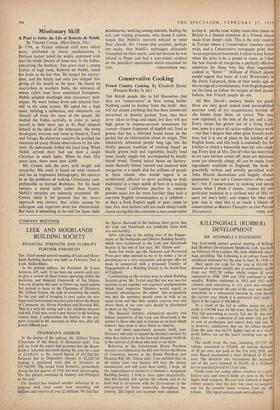Missionary Skill
IN 1594, as France endured civil wars which Many attributed to Jesuit machinations, a Parisian lawyer noted the widely expressed wish that the whole Society of Jesus was 'in the Indies, converting the heathen.' Ten years later a young Italian of high rank, Roberto de Nobili, sailed for India to do just that. He longed for martyr- dom, and his family had only just stopped him giving all his wealth to the poor. He found no martyrdom in southern India, the tolerance of whose rulers must have astonished Europeans. Nobili adopted startlingly new missionary tech- niques. He wore Indian dress and adapted him- self to the caste system. He opted for a high caste, befitting a nobleman, and voluntarily cut himself off from the mass of the people. He studied the Vedas carefully, in order to 'adapt myself to their ideas just as St. Paul adapted himself to the ideas of the Athenians.' He wrote theological treatises and verse in Sanskrit, Tamil and Telugu. By elaborate casuistry he justified the retention of many Hindu observances by his con- verts. He judiciously bribed the local king. When Nobili arrived there had not been a single Christian in south India. When he died, fifty years later, there were over 4,000.
Mr. Cronin tells the story with insight and sympathy. His work is based on wide research and has an impressive bibliography. He conveys to us the problems of making Christianity com- prehensible to learned Brahmins. Yet his book remains a moral fable rather than history. Nobili's miracles are solemnly recounted. Mr. Cronin takes it for granted that his hero's approach was correct, that critics among his colleagues and superiors were not disinterested. But there is something to be said for those older missionaries, working among outcasts, healing the sick and visiting prisoners, who found it unfor- tunate that Nobili's converts refused to enter their church. Mr. Cronin also assumes, perhaps too easily, that Nobili's techniques ultimately triumphed on their merits, and not because he was related to Popes and had a convenient cardinal on the pontifical commission which examined his


































 Previous page
Previous page